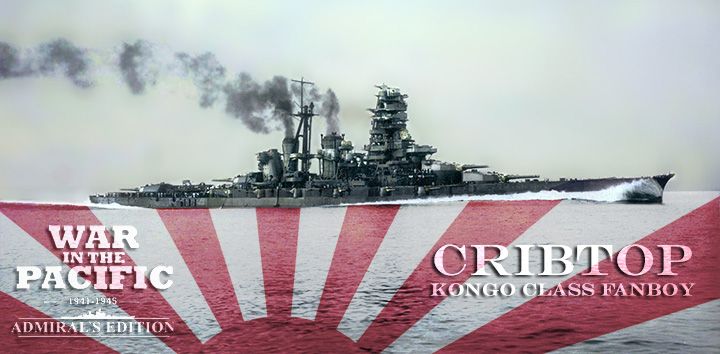Canoerebel
Posts: 21100
Joined: 12/14/2002
From: Northwestern Georgia, USA
Status: offline

|
About a week ago, a kind reader posted a helpful pointer about ship movement between Balboa and Capetown. He noted that a TF can be set to maximum speed, that doing so will reduce the time of transit from 21 days to 10 days (at least for TFs that travel the speed of CV Hornet and her escorts), and that doing so does not incur any damage or fuel consumption.
Presto, I gleefully mulled over the possibilities of expediting travel for my combat and carrier TFs from Pacific to Indian Ocean and back. Imagine how useful it might be when it comes time to use my carriers to cover an invasion in NoPac and then get them back to India to cover things there. Imagine the possibilities if Steve wasn’t aware of this shortcut, made a calculation based on the "normal" transit time of 21 days, and then stumbled into a carrier force he "knew" couldn't be present for another couple of weeks.
I mulled this over for a week. On the one hand, it seems a reasonable thing to take advantage of this because it “dampens” the effect of the design flaw that prevents a player from recalling TFs in transit between, say, Balboa and Capetown. You send Hornet on her way to African, need to recall her one day later, but can’t. She’s committed to the three-week journey there…and then three weeks back. Use the new shortcut and you cut the total time away to about 20 days.
Nevertheless, I don’t think the designers meant for off-map transit to work this way. I decided today that I will forego this. I notified Steve, who told me he wasn’t even aware this is possible.
This prompts me to write my thoughts about House Rules and Fair Play, as I see it and try to apply it, both in this game and in my previous game with Chez.
Over the past few months I’ve implemented a two-part test to determine whether a particular practice is unfair (according to my own lights): (1) was it reasonably possible in the real war, or a reasonable extension of what might have been possible? (2) if not, is there a reasonable way for my opponent to counter it?
If they answer to both is in the negative, then I won’t do it.
Three things I have done in this game and/or recent games have elicited at least some comments (not necessarily negative) regarding fairness. I am and have been satisfied that all three were fair given my test:
1) Use of Picket Ships: While I am shifting to using combat ships more and more for picket duty, I still use merchant vessels. This satisfies the first part of my two-prong test, because, while not strictly done in the war, it best replicates important aspects of the war that otherwise would be ludicrously absent. For instance, without use of picket ships, Steve could park the KB off the West Coast, largely undetected, and send it sprinting in to launch raids against industrial targets. I trust there is no player out there that thinks the KB could spend an extended period of time close to the West Coast without the Allies knowing about it and acting accordingly. Moreover, the 24-hour time frame of each turn prevents the Allies from reacting to a threat nearly as quick as they did in the real war. The Allies were not likely to blunder into the KB in the real war and would readily recall ships when circumstances warranted, but in the game you stuck for the full 24 hours. Finally, the Allies had a great deal more information about where enemy carriers were or weren’t than we get in the game. For all these reasons, use of picket ships is a reasonable extension of what the Allies would have done in the war had it been necessary. It is also possible for my opponent to counter the move using air strikes, combat ships, etc.
2) Using Carrier Planes from Airfields: I did this with Ent and Lex’s strike groups in my current game, basing them at Calcutta and scoring crippling hits against two of Steve's CVEs. I'd be surprised if this tactic wasn't done during the war, and it is a reasonable extension of what the Allies might have done under similar circumstances. Also, Steve can counter the tactic if he wishes to.
3) Fortress Palembang: My previous opponent was victimized by this gambit. It was slow in developing and he had it within his means to detect it and stop it or neutralize it for months. He didn’t and eventually it grew into something terrible. IE, he paid for his sins. Were I to somehow manage to implement this gambit against PzH, Nemo or Alfred, they would chuckle endlessly, cauterize the infection to some extent, easily take India, and eventually come back to liquidate my troops on Sumatra. While a full blown Fortress Palembang is an oddity, a Japanese player can definitely prevent it or use it to his advantage.
In my game with PzH, several of his moves have been or are troubling me, while others do not. Here are a few for each category, beginning with those that trouble me:
1) Use of para fragments to gain omniscient information about my garrison, strength and fort levels at Port Blair. This was not possible in the real war and there is no way that I can prevent a para-assault from accomplishing this task.
2) Use of para fragments to half the defensive AV of major outposts or repeatedly using paras, turn after turn, to achieve this effect. Steve has done this at Clark Field and at Changsha and tells me that he intends to do so at Singapore. I don’t like this, because it seems far-fetched that 16 paratroopers would scare the pants off a 100,000 man garrison, especially by the third or fourth time they assaulted over the period of a few days or weeks. Strongly fortified hexes ought to last for a while and abusing (according to my own lights) the paratroop effect to gain an advantage is stretching things.
3) Using small units to gain omniscient information about an enemy stack. Steve just used an artillery unit to cross a river and gain complete information about my stack on the far side. There is no way to stop this and it’s totally unrealistic. (To be candid, I responded to Steve’s use of this tactic by proposing to do the same thing, but my unit refused to cross the river. Now that I’ve thought further through it, though, I won’t use this tactic unless Steve insists on doing so himself.)
Here are a few other “wild and crazy” things that PzH is doing. These I don’t have as much of a problem with, as it is within my power to counter them, at least if I'm playing at an optimum level (which I admit that I don't):
1) Parking his carriers off California and striking my industrial targets, knowing that doing so doesn’t invoke Allied reinforcements, as would obviously occur in the real war. While this isn’t reasonable, I do have the means of countering the strategy by using picket ships and effectively employing my airforce.
2) Capturing rail stations and then transporting whole divisions long distances a day or two after an invasion. In reality, of course, it would take Japan forever to organize rail transportation, if ever. On the other hand, I have the ability to counter this tactic by defending my bases.
3) Capturing bases and instantaneously basing scores or hundreds of aircraft there. Never could have happened, but it’s up to me to keep him away from the bases, etc.
4) Using armor and big infantry units far, far, far beyond his lines, sometimes with their LOC severed. He has two infantry divisions all the way across China and nearly in Afghanistan, probably 1,000 miles from his nearest supply depot. He has armor scooting halfway into Oz with their LOC severed. He has infantry walking far into India nonstop. Silliness, but up to me to garrison and stop or defeat the invader.
I don’t expect everybody to agree with me. I’m not sure anybody will agree with me. But I post this to show that I try my best to play the game within a framework that is fair to both sides. While you might not agree with my two-part test, at least it offers some rational basis to figure out whether I’m abusing an opponent (or the game) unfairly.
Steve and I started the game without House Rules, not on the idea that we wouldn't ever need or use any, but on the idea that we should be able to address anything that comes up, which to this point we've done fairly efficiently.
|
 Printable Version
Printable Version























 New Messages
New Messages No New Messages
No New Messages Hot Topic w/ New Messages
Hot Topic w/ New Messages Hot Topic w/o New Messages
Hot Topic w/o New Messages Locked w/ New Messages
Locked w/ New Messages Locked w/o New Messages
Locked w/o New Messages Post New Thread
Post New Thread